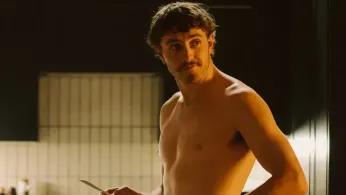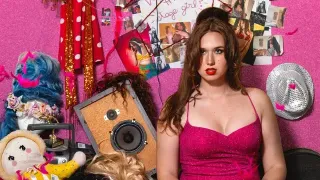
3 hours ago
Paul Mescal's "Sad Gay" Farewell Tour: Is Cinema's Most Tortured Heartthrob Really Calling It Quits?
READ TIME: 5 MIN.
When Paul Mescal uttered the words "I might be finished" in a recent interview, the internet collectively held its breath. For a generation of queer viewers who have watched the 29-year-old Irish actor navigate the emotional landscape of tortured, vulnerable men—often with an undercurrent of queerness—the prospect of his departure from these roles felt almost like a personal loss. But is Mescal really ready to leave behind the artistic territory that has made him a queer cultural phenomenon, or is this simply another chapter in his evolving relationship with the roles that have defined his career?
Mescal's ascent to becoming what many have dubbed the modern "sadboi" icon happened almost organically. His breakthrough role as Connell in the BBC/Hulu series "Normal People" introduced audiences to a character whose emotional repression and vulnerability resonated deeply, particularly within queer communities who saw themselves reflected in his portrayal of a man struggling to express tenderness. From there, his filmography became a carefully curated collection of heartbreak: playing the lovelorn Harry in "All of Us Strangers", Lionel in "The History Of Sound", and William Shakespeare in "Hamnet" - each role a masterclass in masculine fragility and emotional complexity.
What made these performances particularly significant for queer audiences wasn't necessarily the explicit sexuality of the characters, but rather what they represented: men allowed to be soft, to grieve, to love without apology. In an era where toxic masculinity continues to dominate cultural narratives, Mescal's willingness to embody vulnerability became a form of quiet resistance.
When "All of Us Strangers" was announced with Mescal and openly gay actor Andrew Scott as love interests, the internet erupted. Here was a straight man being cast in an explicitly queer role alongside a gay actor, and for many in the community, this raised uncomfortable questions about representation, authenticity, and whether straight actors were taking opportunities from queer performers who already face systemic marginalization.
Rather than shy away from the controversy, Mescal leaned into it with remarkable thoughtfulness. In an interview with "The Sunday Times", he articulated a nuanced position that moved beyond the simplistic "straight actors shouldn't play gay roles" rhetoric. "The issue is that there have been so many queer performances in cinema that have been offensive, but that's because the filmmakers and the actors have been careless," Mescal explained. His point was elegant: the problem isn't inherently about who is cast, but rather about the responsibility that comes with telling queer stories authentically.
This stance aligned with similar perspectives offered by his co-star Andrew Scott, who emphasized that acting itself is about transformation and that reducing casting to identity alone diminishes the craft. Yet the debate itself reflects a deeper tension within the industry—one that remains unresolved. While figures like "Doctor Who" showrunner Russell T Davies have advocated strongly for casting LGBTQ+ actors in LGBTQ+ roles, others, including Sir Ian McKellen, argue that great storytelling transcends such boundaries.
What Mescal's willingness to engage with this conversation demonstrated was a recognition of the stakes involved. He wasn't dismissing the concerns of the queer community; he was acknowledging them while also defending the specific artistic choices made in "All of Us Strangers". For many viewers, this thoughtfulness was refreshing—a reminder that nuance and authenticity matter more than rigid rules.
Beyond the casting debates, what has made Mescal's queer roles so culturally significant is what they've allowed him to articulate about masculinity itself. In his "Sunday Times" interview, he spoke passionately about how men are socialized to suppress vulnerability. "Time and time again, men are told vulnerability is a weakness and not what society requires of them, so it's difficult to reach out for help, "he said.
For queer audiences, this conversation holds particular resonance. Many LGBTQ+ people have spent their lives unlearning toxic masculine ideals, navigating the space between societal expectations and authentic self-expression. Mescal's characters—men who cry, who grieve, who love openly—have provided a cultural mirror and a form of permission. They've shown that softness isn't weakness; it's humanity.
When Mescal spoke out against figures like Andrew Tate and the "version of masculinity that is toxic, "calling it" so dangerous," he was articulating something that resonates across the LGBTQ+ community. His roles have consistently pushed back against this toxicity, offering an alternative vision of what it means to be a man in contemporary culture.
So what does Mescal's suggested departure from these roles actually mean? According to reports, he's set to play Paul McCartney in an upcoming four-film Beatles biopic project slated for 2028. While this represents a significant tonal shift—moving away from the melancholic, introspective characters that have defined his career—it's hardly a retirement from acting or a complete abandonment of complex character work.
The reality is that Mescal's statement about being "finished" with sad gay roles should probably be taken with a grain of salt. Artists frequently express fatigue with the roles they've become known for, only to return to similar territory when the right project comes along. Moreover, the queer community's investment in his work—the way audiences have embraced and celebrated his portrayals—suggests there's an appetite for more.
Interestingly, when asked about his dream role, Mescal expressed a desire to play Sonny Wortzik in a remake of "Dog Day Afternoon"—Al Pacino's iconic role in the 1975 film about a man robbing a bank to pay for his transgender girlfriend's surgery. The role is queer, complex, and deeply human—suggesting that Mescal's interest in queer storytelling may run deeper than a passing phase.
If Mescal does step back from playing explicitly queer characters, it raises important questions about representation in contemporary cinema. The industry has a documented pattern of relying on a small number of actors—often straight men—to carry queer narratives, while simultaneously limiting opportunities for LGBTQ+ performers. Mescal's self-awareness about this dynamic, evidenced by his thoughtful engagement with the casting debate, suggests he understands the responsibility that comes with these roles.
What's clear is that Mescal has given the queer community something valuable: performances that have allowed millions of people to see vulnerability, grief, and love portrayed with dignity and authenticity. Whether he continues in these roles or not, that cultural impact remains.
As audiences await his next moves—whether it's the Beatles biopic or another project entirely—the question of Paul Mescal and sad gays remains delightfully unresolved. He may be tired of playing tortured souls, but the cultural hunger for the kind of masculine vulnerability he's embodied shows no signs of waning. And given his demonstrated commitment to authentic storytelling and his own articulated dream roles, it seems unlikely that queer cinema has seen the last of Paul Mescal.
For now, the queer community can appreciate what he's already given us: a body of work that has normalized vulnerability, challenged toxic masculinity, and provided countless people with characters who reflect their own emotional complexity back to them. Whether that's truly finished or simply entering a new chapter remains to be seen.






